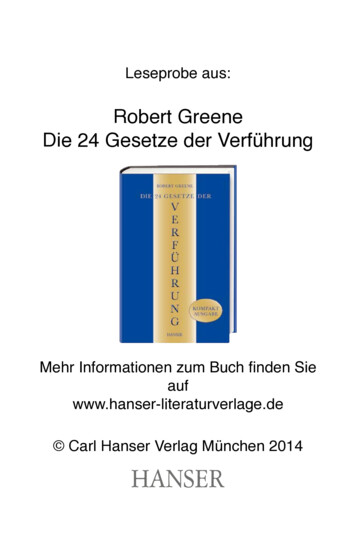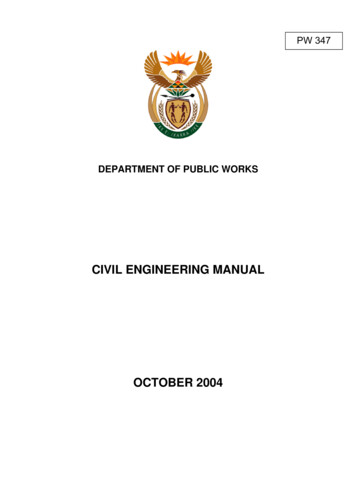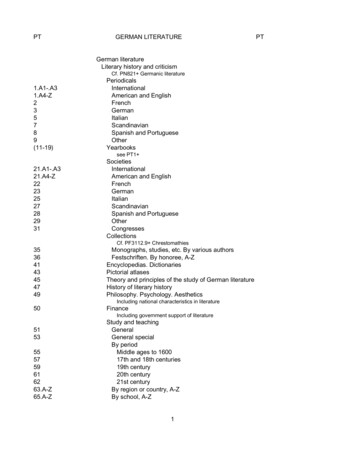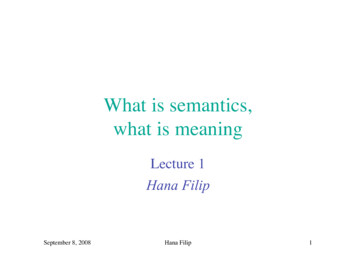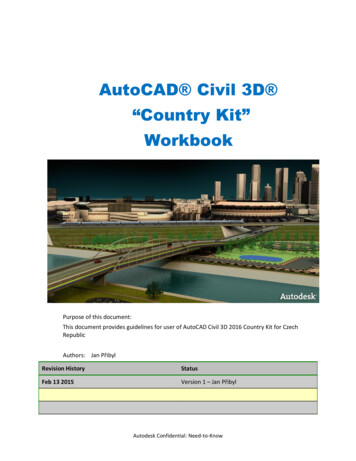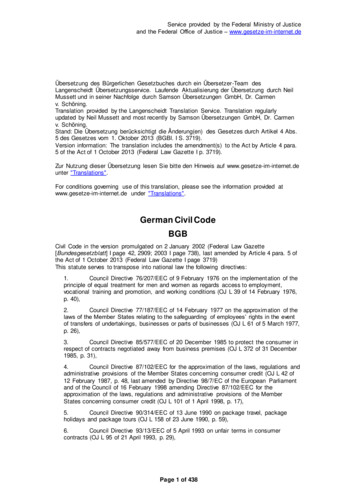
Transcription
Service provided by the Federal Ministry of Justiceand the Federal Office of Justice ‒ www.gesetze-im-internet.deÜbersetzung des Bürgerlichen Gesetzbuches durch ein Übersetzer-Team desLangenscheidt Übersetzungsservice. Laufende Aktualisierung der Übersetzung durch NeilMussett und in seiner Nachfolge durch Samson Übersetzungen GmbH, Dr. Carmenv. Schöning.Translation provided by the Langenscheidt Translation Service. Translation regularlyupdated by Neil Mussett and most recently by Samson Übersetzungen GmbH, Dr. Carmenv. Schöning.Stand: Die Übersetzung berücksichtigt die Änderung(en) des Gesetzes durch Artikel 4 Abs.5 des Gesetzes vom 1. Oktober 2013 (BGBl. I S. 3719).Version information: The translation includes the amendment(s) to the Act by Article 4 para.5 of the Act of 1 October 2013 (Federal Law Gazette I p. 3719).Zur Nutzung dieser Übersetzung lesen Sie bitte den Hinweis auf www.gesetze-im-internet.deunter "Translations".For conditions governing use of this translation, please see the information provided atwww.gesetze-im-internet.de under "Translations".German Civil CodeBGBCivil Code in the version promulgated on 2 January 2002 (Federal Law Gazette[Bundesgesetzblatt] I page 42, 2909; 2003 I page 738), last amended by Article 4 para. 5 ofthe Act of 1 October 2013 (Federal Law Gazette I page 3719)This statute serves to transpose into national law the following directives:1.Council Directive 76/207/EEC of 9 February 1976 on the implement ation of theprinciple of equal treatment for men and women as regards access to employment,vocational training and promotion, and working conditions (OJ L 39 of 14 February 1976,p. 40),2.Council Directive 77/187/EEC of 14 February 1977 on the approximation of thelaws of the Member States relating to the safeguarding of employees’ rights in the eventof transfers of undertakings, businesses or parts of businesses (OJ L 61 of 5 March 1977,p. 26),3.Council Directive 85/577/EEC of 20 December 1985 to protect the consumer inrespect of contracts negotiated away from business premises (OJ L 372 of 31 December1985, p. 31),4.Council Directive 87/102/EEC for the approximation of the laws, regulations andadministrative provisions of the Member States conc erning consumer credit (OJ L 42 of12 February 1987, p. 48, last amended by Directive 98/7/EC of the European Parliamentand of the Council of 16 February 1998 amending Directive 87/102/EEC for theapproximation of the laws, regulations and administrative provisions of the MemberStates concerning consumer credit (OJ L 101 of 1 April 1998, p. 17),5.Council Directive 90/314/EEC of 13 June 1990 on package travel, packageholidays and package tours (OJ L 158 of 23 June 1990, p. 59),6.Council Directive 93/13/EEC of 5 April 1993 on unfair terms in consumercontracts (OJ L 95 of 21 April 1993, p. 29),Page 1 of 438
Service provided by the Federal Ministry of Justiceand the Federal Office of Justice ‒ www.gesetze-im-internet.de7.Directive 94/47/EC of the European Parliament and of the Council of 26October 1994 on the protection of purchasers in respect of certain aspects of contractsrelating to the purchase of the right to use immovable properties on a timeshare basis(OJ L 280 of 29 October 1994, p. 82),8.Directive 97/5/EC of the European Parliament and of the Council of 27 January1997 on cross-border credit transfers (OJ L 43 of 14 February 1997, p. 25),9.Directive 97/7/EC of the European Parliament and of the Council of 20 May1997 on the protection of consumers in respect of distance contracts (OJ L 144 of 4 June1997, p. 19),10.Articles 3 to 5 of Directive 98/26/EC of the European Parliament and of theCouncil of 19 May 1998 on settlement finality in payment and securities settlementsystems (OJ L 166 of 11 June 1998, p. 45),11.Directive 1999/44/EC of the European Parliament and of the Council of 25 May1999 on certain aspects of the sale of consumer goods and associated guarantees (OJ L171 of 7 July 1999, p. 12),12.Articles 10, 11 and 18 of Directive 2000/31/EC of the European Parliament andof the Council of 8 June 2000 on certain legal aspects of information society services, inparticular electronic commerce, in the Internal Market (“Directive on electronic commerce”OJ L 178 of 17 July 2000, p. 1),13.Directive 2000/35/EC of the European Parliament and of the Council of 29 June2000 on combating late payment in commercial transactions (OJ L 200 of 8 August 2000,p. 35).Book 1General PartDivision 1PersonsTitle 1Natural persons, consumers, entrepreneursSection 1Beginning of legal capacityThe legal capacity of a human being begins on the completion of birth.Section 2Beginning of majorityMajority begins at the age of eighteen.Sections 3 – 6(repealed)Section 7Residence; establishment and termination(1) A person who settles permanently in a place establishes his residence in that place.(2) There may be a residence in more than one place at the same time.(3) Residence is terminated if the person abandons the place of residence with the intentionof giving it up.Section 8Residence of persons who lack full capacity to contractPage 2 of 438
Service provided by the Federal Ministry of Justiceand the Federal Office of Justice ‒ www.gesetze-im-internet.de(1) A person who is not capable of contracting or who has limited capacity to contract canneither establish nor terminate residence without the consent of his legal representative.(2) A minor who is or has been married may independently establish and terminateresidence.Section 9Residence of a soldier(1) A soldier has his residence in his garrison. The residence of a soldier who has nogarrison within the country is deemed to be his last garrison within the country.(2) These provisions do not apply to soldiers who are merely doing compulsory militaryservice or who cannot independently establish residence.Section 10(repealed)Section 11Residence of a childA minor child shares the residence of its parents; it does not share the residence of a parentwho lacks the right to care for the person of the child. If neither parent has the right to carefor the person of the child, the child shares the residence of the person who has this right.The child retains the residence until it validly abandons it.Section 12Right to a nameIf the right of a person to use a name is disputed by another person, or if the interest of theperson entitled to the name is injured by the unauthorised use of the same name by anotherperson, the person entitled may require the other to remove the infringement. If furtherinfringements are to be feared, the person entitled may seek a prohibitory injunction.Section 13Consumer*)A consumer means every natural person who enters into a legal transaction for purposesthat predominantly are outside his trade, business or profession.*) Official note: These provisions serve to implement the directives set out above under numbers 3, 4, 6, 7, 9 and 11.Section 14Entrepreneur*)(1) An entrepreneur means a natural or legal person or a partnership with legal personali tywho or which, when entering into a legal transaction, acts in exercise of his or its trade,business or profession.(2) A partnership with legal personality is a partnership that has the capacity to acquire rightsand to incur liabilities.*) Official note: These provisions serve to implement the directives set out above under numbers 3, 4, 6, 7, 9 and 11.Sections 15 - 20(repealed)Title 2Legal personsSubtitle 1AssociationsChapter 1General provisionsSection 21Non-commercial associationPage 3 of 438
Service provided by the Federal Ministry of Justiceand the Federal Office of Justice ‒ www.gesetze-im-internet.deAn association whose object is not commercial business operations acquires legalpersonality by entry in the register of associations of the competent local court [Amtsgericht].Section 22Commercial associationAn association whose object is commercial business operations acquires legal personality,for lack of special provisions under federal law, by state grant. The grant is in the power ofthe Land in whose territory the association has its seat.Section 23(repealed)Section 24SeatThe seat of an association, unless otherwise provided, is the place where the managementis conducted.Section 25ConstitutionThe constitution of an association with legal personality is, to the extent that it is not basedon the following provisions, determined by the articles of association.Section 26Board and representation(1) An association must have a board. The board represents the association in court and outof court; it has the status of a legal representative. The extent of the power of agency may berestricted by the articles of association with effect against third parties.(2) If the board consists of several persons, the association is represented by the majority ofthe board members. If a declaration of intent is to be submitted to an association, it issufficient to submit it to one member of the board.Section 27Appointment of and management by the board(1) The appointment of the board is by resolution of the general meeting.(2) The appointment is revocable at any time, notwithstanding the claim to payment inconformity with contract. The revocability may be restricted by the articles of association tothe case where there is a compelling reason for the revocation; such a reason includeswithout limitation a gross breach of duty or inability to effect proper management.(3) The management by the board is governed by the provisions on mandate in s ections 664to 670 with the necessary modifications.Section 28Passing of resolutions by the boardIn case of a board consisting of more than one person, resolutions are passed under theprovisions of sections 32 and 34, which govern the resolutions of the members of theassociation.Section 29Emergency appointment by local court [Amtsgericht]To the extent that the board is lacking the necessary members, they are to be appointed, inurgent cases, for the period until the defect is corrected, on the application of a personconcerned, by the local court [Amtsgericht] that keeps the register of associations for thedistrict in which the association has its seat.Section 30Special representativesPage 4 of 438
Service provided by the Federal Ministry of Justiceand the Federal Office of Justice ‒ www.gesetze-im-internet.deIt may be provided by the articles of association that, in addition to the board, specialrepresentatives are to be appointed for particular transactions. In case of doubt, the power ofagency of such a representative extends to all legal transactions that the sphere of businessallocated to him normally entails.Section 31Liability of an association for organsThe association is liable for the damage to a third party that the board, a member of theboard or another constitutionally appointed representative causes through an act committedby it or him in carrying out the business with which it or he is entrusted, where the act givesrise to a liability in damages.Section 31aLiability of members of executive bodies and special representatives(1) If members of executive bodies or special representatives act free of charge, or if theyreceive remuneration for their activity which does not exceed 720 euros per year, they areliable towards the association for damage caused in performing their duties only in case ofintent or gross negligence. Sentence 1 also applies to liability towards the members of theassociation. If there is a dispute as to whether a member of an executive body or a specialrepresentative has caused damage with intent or gross negligence, the burden of proof isincumbent on the association or on the member of the association.(2) If members of executive bodies or special representatives are obliged undersubsection (1) sentence 1 to provide to another party compensation for damage which theycaused in performing their duties, they may demand from the association to be releasedfrom the obligation. Sentence 1 does not apply if the damage was caused with intent orgross negligence.Section 31bLiability of members of the association(1) If members of the association act for the association free of charge, or if they receiveremuneration for their activity which does not exceed 720 euros per year, they are liable toprovide to the association compensation for damage caused in performing the duties of theassociation, in accordance with the articles of association, that have been assigned to them,only in case of intent or gross negligence. Section 31a (1) sentence 3 applies with thenecessary modifications.(2) If members of the association are obliged under subsection (1) sentence 1 to provide toanother party compensation for damage which they caused in performing the duties of theassociation, in accordance with the articles of association, that have been assigned to them,they may require the association to release them from the obligation. Sentence 1 does notapply if the members of the association have caused the damage with intent or grossnegligence.Section 32General meeting; passing of resolutions(1) The affairs of the association, to the extent that they are not to be attended to by theboard or another organ of the association, are dealt with by resolution in a meeting of themembers. In order for the resolution to be valid, it is necessary for the subject to be statedwhen the meeting is convened. The resolution is decided by the majority of the votes cast.(2) Even without a meeting of the members, a resolution is valid if all members declare theirapproval of the resolution in writing.Section 33Amendment of articles of association(1) A resolution containing an amendment of the articles of association must have a majorityof three quarters of the votes cast. In order to alter the objects of the association, thePage 5 of 438
Service provided by the Federal Ministry of Justiceand the Federal Office of Justice ‒ www.gesetze-im-internet.deapproval of all members is necessary; the approval of the members not present must bedeclared in writing.(2) If the legal personality of the association results from a grant, the consent of thecompetent authority is necessary for every amendment of the articles of association.Section 34Exclusion from votingA member has no right to vote if the resolution concerns entering into a legal transaction withhim or commencing or disposing of litigation between him and the association.Section 35Special rightsSpecial rights of a member may not be adversely affected by a resolution of the generalmeeting without his approval.Section 36Convening of the general meeting(1) The general meeting is to be convened in the cases laid down in the articles ofassociation and when the interests of the association require it.Section 37Convening a meeting at the request of a minority(1) The general meeting is to be convened if the proportion of the membership laid down inthe articles of association or, in the absence of a provision, one-tenth of the members call inwriting for a meeting to be convened, stating the purpose and the reasons.(2) If the request is not granted, the local court [Amtsgericht] may authorise the memberswho made the request to convene the meeting; it may make orders on the conduct of thechairmanship at the meeting. The court with jurisdiction is the local court [Amtsgericht] thatkeeps the register of associations for the district in which the association has its seat. Theauthorisation must be referred to in the notice convening the meeting.Section 38MembershipMembership is not transferable and not inheritable. The exercise of membership rightscannot be entrusted to another person.Section 39Leaving the association(1) The members have the right to leave the association.(2) The articles of association may specify that leaving is admissible only at the end of abusiness year or only after a notice period; the maximum notice period is two years.Section 40Flexible provisionsThe provisions of section 26 (2) sentence 1, section 27 (1) and (3), sections 28 and 31a (1)sentence 2, as well as sections 32, 33 and 38, do not apply where otherwise provided by thearticles of association. It is not possible to derogate from s ection 34 through the articles ofassociation, even for the passing of resolutions by the board.Section 41Dissolution of the associationAn association may be dissolved by resolution of the general meeting. The resolution musthave a majority of three-quarters of the votes cast, unless otherwise provided in the articlesof association.Section 42InsolvencyPage 6 of 438
Service provided by the Federal Ministry of Justiceand the Federal Office of Justice ‒ www.gesetze-im-internet.de(1) An association is dissolved by the commencement of insolvency proceedings and on theorder becoming legally final by means of which the commencement of the insolvencyproceedings has been rejected for insufficiency of assets. If the proceedings arediscontinued on the application of the debtor or terminated after the confirmation of aninsolvency plan that provides for the association to continue in existence, the generalmeeting may pass a resolution that the association is to continue in existence. The articles ofassociation may provide that, if insolvency proceedings are commenced, the association isto continue as an association without legal personality; in this case too, if the requirements ofsentence two above are satisfied, a resolution may be passed to continue the association asan association with legal personality.(2) If an association is insolvent or is overindebted, the board must petition for thecommencement of insolvency proceedings. If there is delay in petitioning, the members ofthe board who are at fault are responsible to the creditors for the damage resulting from this;they are liable as joint and several debtors.Section 43Deprivation of legal personalityAn association whose legal personality is the result of a grant can be deprived of its legalpersonality if it pursues objects different from those in the articles of association.Section 44Jurisdiction and proceedingsJurisdiction and the procedure for the deprivation of legal personality under section 43 aredecided under the law of the Land in which the association has its seat.*) Under Article 129 of the Basic Law [Grundgesetz], the Federal Minister of the Interior [Bundesminister des Innern] is nowcompetent.Section 45Devolution of the assets of the association(1) On the dissolution of the association or its deprivation of legal personality, the assetsdevolve on the persons specified in the articles of association.(2) The articles of association may provide that the persons entitled to receive the assets arespecified by a resolution of the general meeting or by another organ of the association. If theobjects of the association are not commercial business operations, the general meeting may,even without such a provision, allocate the assets to a public foundation or institution.(3) If no persons entitled are specified, then if according to its articles the associationexclusively served the interests of its members, the assets pass in equal shares to themembers at the date of the dissolution or the deprivation of legal personality, and failing thisto the treasury of the Land in whose territory the association had its seat.Section 46Devolution on the treasuryIf the assets of the association devolve on the treasury, the provisions on an inheritance thatdevolves on the treasury as the heir on intestacy apply with the necessary modifications. Thetreasury shall if possible use the assets in a manner corresponding to the objects of theassociation.Section 47LiquidationIf the assets of the association do not devolve on the treasury, there must be a liquidation,unless insolvency proceedings have commenced with regard to the assets of theassociation.Section 48LiquidatorsPage 7 of 438
Service provided by the Federal Ministry of Justiceand the Federal Office of Justice ‒ www.gesetze-im-internet.de(1) The liquidation is effected by the board. Other persons may also be appointed asliquidators; the appointment is governed by the provisions for the appointment of the board.(2) The liquidators have the legal status of the board, unless the purpose of the liquidationleads to a different conclusion.(3) If there are several liquidators, they are only empowered to represent jointly, and canonly enact orders unanimously, unless provided otherwise.Section 49Duties of the liquidators(1) The liquidators must complete the current business, collect the receivables, convert therest of the assets into cash, satisfy the creditors and pay out the surplus to those entitled toreceive it. In order to complete transactions that are in progress, the liquidators may alsoenter into new transactions. The collection of receivables and the conversion of the rest ofthe assets into cash may be omitted to the extent that these measures are not necessary tosatisfy the creditors or to distribute the surplus among those entitled to receive it.(2) The association is deemed to continue in existence until the end of the liquidation if thepurpose of the liquidation requires this.Section 50Public notice of the association in liquidation(1) The dissolution of the association or its deprivation of legal personality must beannounced by the liquidators in a public notice. In the notice, the creditors must berequested to register their claims. The public notice is made through the newspaperspecified in the articles of association for this purpose. Public notice is deemed to have beenmade at the end of the second day after the publication or first publication.(2) Known creditors must be requested by special invitation to register their claims.Section 50aNewspaper for noticesIf an association has not specified a newspaper in the articles of association, or if thenewspaper specified for notices has ceased publication, notices of the association must bepublished in the newspaper that is specified for public notices of the local court [Amtsgericht]in whose district the association has its seat.Section 51One-year waiting periodThe property may not be paid out to the persons entitled to receive it until a year has passedafter the announcement by public notice of the dissolution of the association or thedeprivation of legal personality.Section 52Security for creditors(1) If a known creditor does not register his claim, the amount owed, if the right to depositexists, must be deposited for the creditor.(2) If the discharge of an obligation is not possible at the time, or if an obligation is disputed,the property may be distributed to the persons entitled to receive it only if security is providedto the creditor.Section 53Liability in damages of the liquidatorsLiquidators who commit breaches of their duties under section 42 (2) and sections 50, 51and 52 or who, before the satisfaction of the creditors, distribute assets to the personsentitled to receive are, if they are at fault, responsible to the creditors for the damageresulting from this; they are liable as joint and several debtors.Section 54Associations without legal personalityPage 8 of 438
Service provided by the Federal Ministry of Justiceand the Federal Office of Justice ‒ www.gesetze-im-internet.deAssociations without legal personality are governed by the provisions on partnership. Whena transaction is entered into with a third party in the name of such an association, the personacting is personally liable; if more than one person acts, they are liable as joint and severaldebtors.Chapter 2Registered associationsSection 55Jurisdiction over entry in the registerThe entry of an association of the kind specified in section 21 above in the register ofassociations must be made at the local court [Amtsgericht] for the district in which theassociation has its seat.Section 55aElectronic register of associations(1) The Land governments may provide by statutory order that and to what extent theregister of associations is maintained in electronic form as a computerised data file. It mustbe guaranteed that1.the principles of proper data processing are observed, in particular thatprecautions against a loss of data are taken, the necessary copies of the databases arekept current at least on a daily basis and the original databases and copies of them arekept in safe custody.2.the entries to be made are immediately entered into a memory and it remainspermanently possible to reproduce their contents unchanged in readable form.3.the measures required by the schedule to section 126 (1) sentence 2 no. 3 ofthe Land Register Code [Grundbuchordnung] are taken.The Land governments may by statutory order transfer the authorisation under sentence 1 tothe Land justice administration authorities.(2) The electronic register of associations takes the place of one page of the previousregister as soon as the entries on this page have been entered in the memory intended forthe entries in the register of associations and made available as the register of associations.A note of closure must be added to the corresponding pages of the previous register ofassociations.(3) An entry comes into effect as soon as it is entered in the memory intended for the registerentries and its contents can be permanently reproduced unchanged and in readable form.There must be a verification, by a confirmation message or in another appropriate way, thatthese requirements are satisfied. Each entry should show the dat e on which it came intoeffect.Section 56Minimum number of members of the associationThe entry in the register should be made only if the number of members is at least seven.Section 57Minimum requirements of the articles of association(1) The articles of association must contain the objects, the name and the seat of theassociation and indicate that the association is to be registered.(2) The name should differ appreciably from the names of the registered associations inexistence in the same place or in the same municipality.Section 58Recommended contents of the articles of associationThe articles of association should contain provisions:Page 9 of 438
Service provided by the Federal Ministry of Justiceand the Federal Office of Justice ‒ www.gesetze-im-internet.de1.on becoming a member of the association and leaving it,2.on whether the members are to make contributions, and if so, in what amount,3.on the composition of the board,4.on the conditions under which the general meeting is to be convened, on theform of the convening and on the notarial recording of the resolutions.Section 59Application for registration(1) The board must apply for the association to be registered.(2) Copies of the articles of association and of the documents on the appointment of theboard must be attached to the application.(3) The articles of association should be signed by at least seven members and should statethe date of their execution.Section 60Rejection of the applicationIf the requirements of sections 56 to 59 above have not been met, the application must berejected by the local court [Amtsgericht], stating the reasons.Sections 61 - 63(repealed)Section 64Contents of the entry in the register of associationsOn entry in the register, the name and seat of the association, the date of the execution ofthe articles, the members of the board and their powers of representation are to be stated.Section 65Addition to nameWhen the association is entered in the register, the name of the association is given theadditional element “eingetragener Verein” [“registered association”].Section 66Public notice of the entry and safeke eping of documents(1) The local court [Amtsgericht] must publish the entry of the association in the register ofassociations by means of publication in the electronic information and communicationsystem designated by the Land justice administration authority.(2) The documents submitted with the application are kept by the local court [Amtsgericht].Section 67Changes to the board(1) Every change to the board must be notified by the board for registration. A copy of thedocument about the change is to be attached to the notification.(2) Board members appointed by the court are entered in the register by the court at its ownmotion.Section 68Protection of public confidence by the register of associationsIf a transaction is entered into between the previous members of the board and a third party,the change of the board can be used as a defence against the third party only if at the timewhen the legal transaction is entered into the change has been recorded in the register ofassociations or is known to the third party. If the change has been entered, the third partyneed not allow it to apply against him if he does not know of it and his lack of knowledgedoes not result from negligence.Page 10 of 438
Service provided by the Federal Ministry of Justiceand the Federal Office of Justice ‒ www.gesetze-im-internet.deSection 69Evidence of composition of the boardEvidence that the board consists of the persons entered in the register is furnished to publicauthorities in the form of a local court [Amtsgericht] certificate confirming the entry.Section 70Protection of public confidence in case of entries on power of agency; passingresolutionsThe provisions of section 68 above also apply to provisions that restrict the scope of thepower of agency of the board or that lay down different arrangements for the power ofagency of the board than the provision in section 26 (2) sentence 1 above.Section 71Amendments of the articles of association(1) Amendments of the articles of association are effective only when entered in the registerof associations. The board must make notification of the amendment for entry in the register.A copy of the order containing the amendment and of the wording of the articles ofassociation is to be enclosed with the registration. In the wording of the articles ofassociation, the amended provisions must agree with the order on the amendment of thearticles of association, unchanged provisions must agr
German Civil Code BGB Civil Code in the version promulgated on 2 January 2002 (Federal Law Gazette [Bundesgesetzblatt] I page 42, 2909; 2003 I page 738), last amended by Article 4 para. 5 of the Act of 1 October 2013 (Federal Law Gazette I page 3719) This statute serves to


